|
|
|
Sort Order |
|
|
|
Items / Page
|
|
|
|
|
|
|
| Srl | Item |
| 1 |
ID:
141057
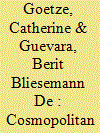

|
|
|
|
|
| Summary/Abstract |
Cosmopolitanism has been argued to be a crucial component of peacebuilding, both with regard to its aims as well as its staff. In a universalist-liberal understanding of the concept, cosmopolitanism is the optimal mind frame for peacebuilders to rebuild post-war societies, due to the tolerance, justice-orientation, and neutrality regarding local cleavages that the concept entails in theory. This article argues, however, that cosmopolitanism cannot be understood outside of its social context, therefore requiring sociological empirical analyses. Drawing on three such sociological concepts, namely elite, glocal, and localisable cosmopolitanism, the article analyses empirically through interviews with peacebuilders in Kosovo whether and in which form these international civil servants display cosmopolitan worldviews. The study concludes that while in theory the localisable variant would be best suited to contribute to locally sensitive, emancipatory peacebuilding, this form of cosmopolitanism is absent in practice. Given the novel, exploratory character of this analysis of hitherto uncharted terrain, the article also discusses in detail how the findings were obtained and in how far they are generalisable.
|
|
|
|
|
|
|
|
|
|
|
|
|
|
|
|
| 2 |
ID:
141055
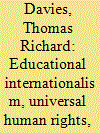

|
|
|
|
|
| Summary/Abstract |
Robert Owen, the early nineteenth-century social reformer, made a greatly more significant contribution to the theory and practice of International Relations than has hitherto been assumed. This article shows how Owen helped to develop an understudied but distinctive form of internationalist thought focusing on the role of education in the pursuit of peace. Owen's previously neglected contributions to human rights norms and to international organisation are also explored, including his promotion of universal rather than nationally-oriented human rights standards, his role in the nascent movement towards the formation of international non-governmental organisations, and his contribution to international federalist ideas. Following an introduction to Owen's place in the literature, this article discusses each of these contributions of Owen to the theory and practice of International Relations in turn. The analysis reveals that Owen's contributions in each of these aspects are as significant for their limitations as for their insights
|
|
|
|
|
|
|
|
|
|
|
|
|
|
|
|
| 3 |
ID:
141058


|
|
|
|
|
| Summary/Abstract |
This article addresses the issue of disciplinary variety in French International Relations (IR) from the perspective of Bourdieu's scientific field theory. The tug of war between ‘dominants’ and ‘pretenders’ for the control of IR as ‘their’ discipline in French academia originates from the difficulty of (only) one discipline, that is, political science, monopolising IR. Compared to other subfields of political science, IR is the field of research that borrows most from other scholarly disciplines. These difficulties strengthened the imperviousness of French IR to the works of IR scholars from the Anglo-American world; until very recently, insularity and particularism could not proceed much further. This period matches roughly to one in which IR was dominated, in France, by law and history. Today there is still a very strong influence of this period when scholars from disciplines other than political science distrusted IR theories. Other reasons related to the issue of the disciplinary variety of IR, for instance the absence of a general acknowledgment of the peer-review system, may contribute to the complexity, if not confusion, which characterises the identify of French IR.
|
|
|
|
|
|
|
|
|
|
|
|
|
|
|
|
| 4 |
ID:
141051
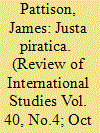

|
|
|
|
|
| Summary/Abstract |
There has been widespread and vociferous condemnation of Somali piracy and several states have used force against the pirates. This reflects the prevailing view of pirates as belligerents and aggressors who act wrongly. In this article, I challenge this view by defending the conditional moral permissibility of piracy. More specifically, I first argue that piracy can be morally permissible when certain conditions are met. These are what I call the principles of ‘justa piratica’, that is, the principles of just piracy. Second, I claim that these conditions are likely to apply to some Somali pirates. Third, as a corollary, I argue that the case of piracy shows that one of the shibboleths of Just War Theory – that a war cannot be just on both sides – is mistaken.
|
|
|
|
|
|
|
|
|
|
|
|
|
|
|
|
| 5 |
ID:
141054


|
|
|
|
|
| Summary/Abstract |
This article explores L. T. Hobhouse's transformation of liberal internationalism at the beginning of the twentieth century. It argues that Hobhouse's thought contributes to understanding dilemmas within the frame of liberal internationalism and the emergence of international functionalism. Using a philosophical approach, Hobhouse tackled international concerns throughout his life, alongside J. A. Hobson, Gilbert Murray, James Bryce, H. N. Brailsford, Norman Angell, and G. L. Dickinson. He restated a belief in human progress and association in ever-greater circles. But he noted, contra former hopes, that nationalism furthered democracy only briefly, and that liberal democracy remained incapable of bringing about effective international cooperation and moral universalism. In order to resolve this impasse, Hobhouse suggested substituting political with economic democracy on an international scale. The aim was to create an international functional organisation consisting of vocational and civic associations and states, which would allow individuals to entertain multiple, overlapping, and transnational loyalties. He thus anticipated proposals for global reform that became increasingly popular after the end of World War II. However, in spite of his concern with domestic social equality and his borrowing from international socialism, Hobhouse failed to qualify his internationalism with an analogous interest in equality.
|
|
|
|
|
|
|
|
|
|
|
|
|
|
|
|
| 6 |
ID:
141053
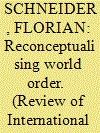

|
|
|
|
|
| Summary/Abstract |
At the outset of the twenty-first century, the world is facing a range of problems, including environmental, economic, and security risks, that increasingly challenge the logic of nation-state governance. While American and European models of International Relations and global governance, such as the Westphalian system of states and the Washington Consensus, have come under attack from poststructuralist thinkers, political philosophers from China and Taiwan have tried to reconceptualise the world of the twenty-first century from their own perspectives. This article examines current streams of Chinese International Relations theorising and confronts them with the case of territorial disputes in the East China Sea. The article analyses the arguments by Chinese realists, ‘worldists’, and procedural constructivists, showing how Chinese scholars creatively revive pre-modern Chinese political theory in attempts to provide new ways in which International Relations scholars might view the world, or: ‘all-under-heaven’. I argue that these contributions will progressively challenge conventional theories of International Relations, while at the same time contending that so-called non-Western theorising, if it is to contribute to IRT, will require additional rigorous empirical grounding, a critical perspective on its entanglement with nationalist political discourses in East Asian societies, and the willingness to incorporate existing theories.
|
|
|
|
|
|
|
|
|
|
|
|
|
|
|
|
| 7 |
ID:
141052
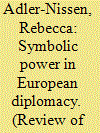

|
|
|
|
|
| Summary/Abstract |
National diplomacy is challenged by the rise of non-state actors from transnational companies to non-governmental organisations. In trying to explain these challenges, scholars tend to either focus on a specific new actor or argue that states will remain the dominant diplomatic players. This article develops an alternative Bourdieu-inspired framework addressing symbolic power. It conceptualises diplomacy in terms of a social field with agents (field incumbents and newcomers alike) who co-construct and reproduce the field by struggling for dominant positions. The framework is applied to the EU's new diplomatic service (the European External Action Service, EEAS), which is one of the most important foreign policy inventions in Europe to date. I show that the EEAS does not challenge national diplomacy in a material sense – but at a symbolic level. The EEAS questions the state's meta-capital, that is, its monopoly of symbolic power and this explains the counter-strategies adopted by national foreign services. The struggles to define the ‘genuine’ diplomat reveal a rupture in the European diplomatic field, pointing towards a transformation of European statehood and the emergence of a hybrid form of diplomacy. A focus on symbolic power opens up new avenues for the study of transformations of authority in world politics.
|
|
|
|
|
|
|
|
|
|
|
|
|
|
|
|
| 8 |
ID:
141056


|
|
|
|
|
| Summary/Abstract |
How can trusting relationships be identified in international politics? The recent wave of scholarship on trust in International Relations answers this question by looking for one or the combination of three indicators – the incidence of cooperation; discourses expressing trust; or the calculated acceptance of vulnerability. These methods are inadequate both theoretically and empirically. Distinguishing between the concepts of trust and confidence, we instead propose an approach that focuses on the actors' hedging strategies. We argue that actors either declining to adopt or removing hedging strategies is a better indicator of a trusting relationship than the alternatives. We demonstrate the strength of our approach by showing how the existing approaches would suggest the US-Soviet relationship to be trusting when it was not so. In contrast, the US-Japanese alliance relationship allows us to show how we can identify a developing trusting relationship.
|
|
|
|
|
|
|
|
|
|
|
|
|
|
|
|
|
|
|
|
|